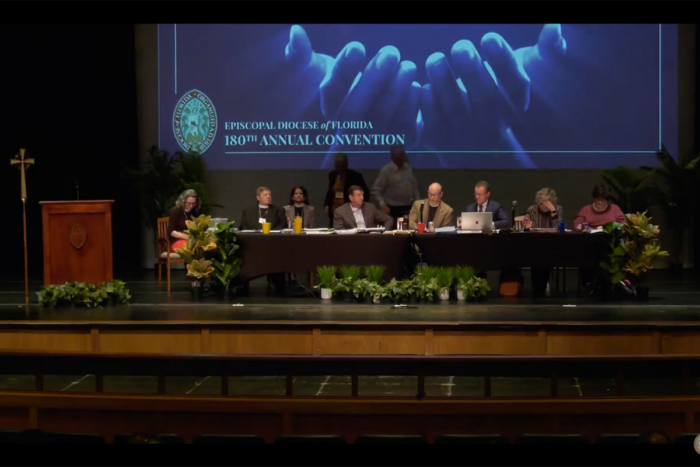Diocese of Florida plans convocation to foster ‘new day’ of healing after divisions under HowardPosted Nov 13, 2023 |
|

The Diocese of Florida holds its convention Nov. 11 at the Episcopal School of Jacksonville, as seen on video of the proceedings.
[Episcopal News Service] The Diocese of Florida on Nov. 11 held its first convention since the retirement of Bishop John Howard, and members of the standing committee pledged to start “a new day” of healing after the diocese was torn by divisions at the end of Howard’s 20-year episcopate.
In recent months, diocesan leaders have worked with Bishop Mary Gray-Reeves, the House of Bishops vice president and a trained conflict mediator, to help guide the healing process. At the diocesan convention, leaders revealed details of a convocation that Gray-Reeves is scheduled to facilitate on Jan. 27 as the diocese discerns next steps.
“It’s a new day in the Diocese of Florida, and there is a ton to celebrate,” the Rev. Joe Gibbes, the outgoing standing committee president, said in his convention address. “There is some really excellent work being done. There’s also a ton of work to do.” Gibbes alluded to the divisions in the diocese under Howard, whose retirement took effect Oct. 31.
Opponents had accused Howard of a pattern of discrimination against LGBTQ+ clergy and their allies. Those allegations came to a head last year in the two attempted elections of Howard’s successor. The Rev. Charlie Holt was elected twice but never consecrated after some Florida clergy and lay leaders prevailed in their objections to diocesan procedures, Holt’s fitness to serve and the leadership culture under Howard.
Rather than elaborating on those controversies in his address, Gibbes urged members of the diocese to come together. Those who disagree should not be dismissed as “the problem,” he said, because there is hurt on all sides and listening to each other with Christian compassion is the only way forward.
“It is time to lay down our weapons,” Gibbes said. “We are, as a diocese, standing at a fork in the road, and which path we go down will determine the future of this diocese. The fork in the road is not a choice between traditional conservative ideologies on one hand and progressive liberal ideologies on the other. … There is much more at stake than that. The choice before us is between mutual flourishing and diocesan disintegration.”
The convention was held at the Episcopal School of Jacksonville. Clergy and lay delegates had been expected to vote on a series of changes to the diocese’s canons and articles of incorporation that included a measure that would have tightened the diocese’s criteria for delegates who get to vote at conventions, including for bishop. The convention adjourned, however, without taking up most of those resolutions, including the measure changing delegate criteria, amid concerns that a quorum was no longer present at the end of the day.
Earlier in the day, the Rev. Teresa Seagle, a returning standing committee member, echoed Gibbes’ plea for diocesan members to be open to the healing process.
“It’s a new day, and yes, there is work to do. There are things that must be addressed,” Seagle said in her convention address. “Most importantly we have to listen to one another. We have to care for one another.”
Seagle also announced that a 2024 diocesan convention had been scheduled for next September. The standing committee, which took over as ecclesiastical authority upon Howard’s retirement, has been in conversations with some candidates for an assisting bishop or bishop provisional, she added, but no decision has been made yet. In the meantime, Bishop Jay Lambert has agreed to assist the diocese at least through the end of 2023.
The standing committee also welcomed Gray-Reeves to speak to the convention by video.
“I am honored and grateful for your invitation to walk with you in this journey,” Gray-Reeves said. “My engagement with you over these recent months has been tender, it’s been tenuous, it’s been touching. And I know that there is so much love between you, and that conflict and criticism, believe it or not, is a sign of that love.”
– David Paulsen is a senior reporter and editor for Episcopal News Service. He can be reached at dpaulsen@episcopalchurch.org.

Social Menu